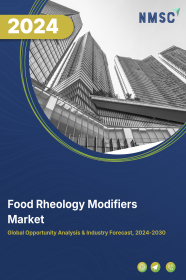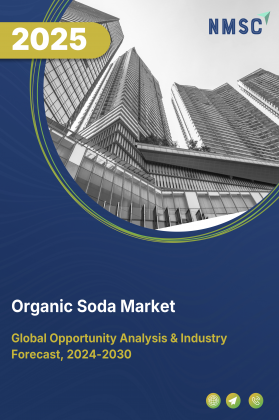
Food Rheology Modifiers Market by Type (Emulsifiers, Anti-Caking Agent, Hydrocolloids, and Others), by Source (Botanical, Microbial, Animal, Seaweed, and Synthetic), and by Application (Dairy & Frozen Products, Beverage, Confectionery, Meat, Poultry & Seafood, Oils & Fats, and Others) – Global Opportunity Analysis and Industry Forecast, 2024-2030
Market Definition
The global Food Rheology Modifiers Market size was valued at USD 2.53 billion in 2023 and is predicted to reach USD 3.66 billion by 2030 with a CAGR of 5.4% from 2023 to 2030. Food rheology modifiers refer to substances that are added to food products to modify their physical properties, such as texture, viscosity, and flow behavior. These substances can be either natural or synthetic. They are designed to alter the rheological properties of food products, in order to improve their overall quality and functionality.
Food rheology modifiers are used in the food industry for a variety of reasons. As they can improve the texture of foods, making them smoother, creamier, or more elastic. They can also help to stabilize emulsions and prevent separation of ingredients in foods such as salad dressings and mayonnaise.
In addition, food rheology modifiers can enhance the sensory properties of food products, such as the mouthfeel or taste, making them more appealing to consumers. The use of food rheology modifiers in food products is a common and important practice in the food industry. By altering the physical properties of foods, these substances can help to improve the quality, stability, and overall consumer appeal of food products.
Market Dynamics and Trends
Growing consumer preferences for clean label products is propelling the growth of the food rheology modifiers market. Consumers are increasingly seeking clean label products that are free from artificial additives and have transparent ingredient lists. Food rheology modifiers derived from natural sources, such as gums and plant extracts, are in high demand as they provide functionality while meeting clean label requirements.
Also, rising demand for functional beverages such as plant milks, fortified fruit drinks, and enhanced water owing to the growing health consciousness among people is further driving the growth of the food rheology modifiers market. Functional beverage that contains vitamins, protein, minerals, fiber, herbs and botanicals for added nutritional and uses food rheology modifiers such as xanthan gum, locust bean gum and gellan gum to increase the viscosity of the liquid.
However, stringent government regulations regarding the use of food additives in food products and insufficient supply of raw materials are the factors restraining the growth of the food rheology modifiers market. On the contrary, increasing adoption of ready meal products and convenience food that uses food rheology modifiers to boost quality and shelf life of these food products is expected to create ample opportunities in the imminent years.
Market Segmentations and Scope of the Study
The food rheology modifiers market share is segmented on the basis of type, source, application, and region. On the basis of type, the market is classified into emulsifiers, anti-caking agent, hydrocolloids, and others. On the basis of source, the market is divided into botanical, microbial, animal, seaweed, and synthetic.
Based on application, the market is classified into dairy & frozen products, beverage, confectionery, meat, poultry & seafood, oils & fats, and others. Regional breakdown and analysis of each of the aforesaid segments includes regions comprising North America, Europe, Asia Pacific, and Rest of World (RoW).
Geographical Analysis
North America holds the dominant share of food rheology modifiers market, and is expected to continue its dominance during the forecast period. This is attributed to the factors such as high consumption of frozen products such as breads, pizzas, donuts, and muffin that uses hydrocolloids to improve texture and moisture retention to enhance the overall quality of the backed products. According to the American Frozen Food Institute (AFFI), frozen food sales in the U.S. have been on the rise in recent years, with a notable 8.6% increase in 2022, reaching a total of USD 72.2 billion.
Moreover, presence of key market players such as Ingredion Inc, DuPont de Nemours Inc. and Cargill Inc., and further boosts the market growth in this region. For instance, in March 2020, Ingredion launched Clean Label Emulsifier called EVANESSE CB6194 to help food manufacturers solve top formulating challenges associated with clean label applications.
The Asia Pacific region is poised to witness a steady growth in the food rheology modifiers market, primarily due to its large population in countries such as China and India. The significant population size in these countries drives the consumption of various beverages, including carbonated drinks and dairy beverages. These beverages utilize food rheology modifiers such as gelatin and gum arabic to enhance their flavor and texture, thereby contributing to the market's expansion.
Furthermore, the region exhibits a notable beer consumption rate, which also fuels the growth of the food rheology modifiers market. Food rheology modifiers such as carrageenan are used in beer production to reduce the formation of haze in the finished product. For instance, in December 2020, a report released by Kirin Beer University in December 2020 highlighted that China and Japan ranked among the top ten countries worldwide in terms of beer consumption.
Competitive Landscape
Various market players operating in the food rheology modifiers industry includes BASF SE, Dow Inc, Ashland Global Holdings Inc., Kraton Corporation, Evonik Industries AG, Solvay S.A., CP Kelco, Tate & Lyle PLC, Ingredion Incorporated, FMC Corporation, among others. These market players are introducing latest products across various regions to maintain their dominance in the food rheology modifiers market.
For instance, in March 2022, CP Kelco launched a line of multifunctional ingredients for plant-based burgers and sausages, including clean-label gellan gum that adds hot bite and meat-like texture. Also, it is easy to work with and produces a less-sticky dough, making it ideal for forming burger patties. Gellan gum is also widely used in plant-based and dairy alternative beverages.
Key Benefits
-
The report provides a quantitative analysis and estimations of the food rheology modifiers market from 2023 to 2030, which assists in identifying the prevailing market opportunities.
-
The study comprises a deep dive analysis of the current and future food rheology modifiers market trends, to depict prevalent investment pockets in the industry.
-
Information related to key drivers, restraints, and opportunities and their impact on the food rheology modifiers market is provided in the report.
-
Competitive analysis of the players, along with their market share is provided in the report.
-
SWOT analysis and Porter's Five Forces model is elaborated on in the study.
-
Value chain analysis in the market study provides a clear picture of the roles of the stakeholders.
Food Rheology Modifiers Market Key Segments
By Type
-
Emulsifiers
-
Anti-Caking Agent
-
Hydrocolloids
-
Others
By Source
-
Botanical
-
Microbial
-
Animal
-
Seaweed
-
Synthetic
By Application
-
Dairy & Frozen Products
-
Beverage
-
Confectionery
-
Meat, Poultry & Seafood
-
Oils & Fats,
-
Others
By Region
-
North America
-
The U.S.
-
Canada
-
Mexico
-
-
Europe
-
The UK
-
Germany
-
France
-
Italy
-
Spain
-
Denmark
-
Netherlands
-
Finland
-
Sweden
-
Norway
-
Russia
-
Rest of Europe
-
-
Asia-Pacific
-
China
-
Japan
-
India
-
South Korea
-
Australia
-
Indonesia
-
Singapore
-
Taiwan
-
Thailand
-
Rest of Asia-Pacific
-
-
RoW
-
Latin America
-
Middle East
-
Africa
-
Key Players
-
BASF SE
-
Dow Inc
-
Ashland Global Holdings Inc.
-
Kraton Corporation
-
Evonik Industries AG
-
Solvay S.A.
-
CP Kelco
-
Tate & Lyle PLC
-
Ingredion Incorporated
-
FMC Corporation
REPORT SCOPE AND SEGMENTATION:
|
Parameters |
Details |
|
Market Size in 2022 |
USD 20.02 Billion |
|
Revenue Forecast in 2030 |
USD 3.66 Billion |
|
Growth Rate |
CAGR of 5.4% from 2023 to 2030 |
|
Analysis Period |
2023–2030 |
|
Base Year Considered |
2023 |
|
Forecast Period |
2024–2030 |
|
Market Size Estimation |
Billion (USD) |
|
Growth Factors |
Growing consumer preference for clean label products. Rising demand of functional beverages such as plant milks and fortified fruit drinks. |
|
Countries Covered |
28 |
|
Companies Profiled |
10 |
|
Market Share |
Available for 10 companies |
|
Customization Scope |
Free customization (equivalent up to 80 working hours of analysts) after purchase. Addition or alteration to country, regional, and segment scope. |
|
Pricing and Purchase Options |
Avail customized purchase options to meet your exact research needs. |




















 Speak to Our Analyst
Speak to Our Analyst

























